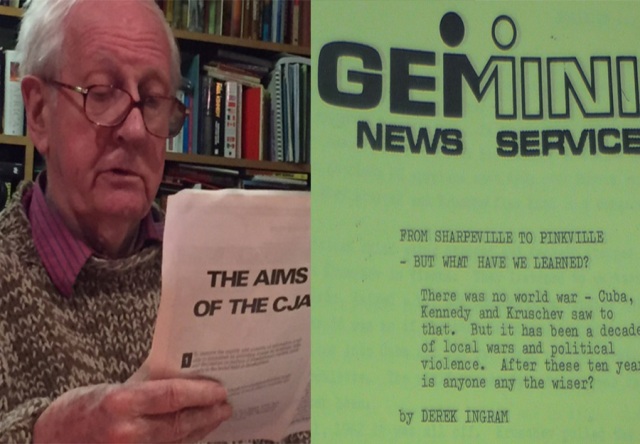 Derek Ingram, the main architect of Gemini News and co-founder of the CJA, says that he's always been "passionate" about the Commonwealth
Derek Ingram, the main architect of Gemini News and co-founder of the CJA, says that he's always been "passionate" about the Commonwealth
In 1967, a new approach to journalism was launched which carved out a way to cover global news from a local perspective.
A small news agency called Gemini News began with a model to develop and tap local expertise to cover the so-called developing world and counter the parachuting in of foreign journalists to cover development from a western perspective.
A conference to explore Gemini’s legacy and what it meant for the growth of development journalism was held in late 2017 by the Institute of Commonwealth Studies (ICwS).
It brought together many who had worked and trained with the organisation which many called the “Commonwealth news agency”.
For a younger generation of journalists brought up in the era of stringers and local correspondent, it seems strange to understand what a breath of fresh air Gemini had been, until you hear the testimonies of those working there at the time.
Exchange of ideas
Opening the conference, Trinidad-born British veteran journalist and broadcaster Trevor McDonald described a colonial upbringing where education and aspirations were seen through the prism of the West.
“What did they [the developing world] think about their changes of development – that is what Gemini focused on,” Sir Trevor told the conference.
Elaine Shein, who had been a young Canadian journalist who found her global footing under Gemini, described the experience as an “exchange of news and ideas between developed and developing countries”.
She said the agency had been strong on the use of people on the ground who could spend time researching their stories.
“Gemini News was exactly what we needed at the time and far ahead of its time,” she said.
Other early Gemini contributors spoke about the subscriber service’s foreign news features which nobody else had been doing at the time.
Britain’s Channel Four broadcaster Lindsay Hilsum, who also worked for Gemini, summed up the approach to journalism at the time as “people like me, writing about people like them for people like me”.
“Far-sighted”
Tributes were made to the “far-sighted” editorial vision of Derek Ingram, Gemini’s architect, who also went on to become one of the founders of the Commonwealth Journalists Association. Gemini staffers in the 60s and 70s described how he went after a local perspective on developments in other parts of the world, also putting resources into nurturing talent from newly-independent nations to develop what became a wealth of journalistic talent whose legacy is still being enjoyed today.
Newspapers across these new Commonwealth countries subscribed to Gemini News, making it the template for the growth of local journalism.
Kayode Soyinka, now the brains behind Africa Today, was 18 years old when he worked as a foreign correspondent for Gemini.
He too described Derek as an editor and mentor: “What he tried to do to empower what we did went far beyond journalism.”
Development journalism
Testimonies from the panellists were matched with shared memories from the audience who talked of the model forged in the 1960s which was way ahead of its time and which went on to fuel what became known as development journalism.
In an afternoon dedicated to looking at development journalism and its future in the digital era, speakers and audience explored the challenges facing news organisations cutting back on in-depth foreign coverage and facing a barrage of platforms and 24/7 news.
Discussion included a questioning look at the role charities and aid agencies with sophisticated media teams have been playing by working closely with under-resourced news organisations. While this gets journalists to the heart of a foreign story, it can also provide the news through that charity’s prism.
The conference also explored the fast-moving world of technology and whether this made it easier to cover rapidly-changing events on the ground.
Saving the legacy
The day’s discussions did not shirk away from the financial hurdles faced by Gemini over the years. It struggled on small budgets for years, was then bought by the UK Guardian in 1983, and then effectively closed down in 2002.
Its main archives went to the Guardian which is pulling together a digital version of its material. Derek’s personal archives will be curated by the ICwS.
Unable to attend the conference himself, 92-year-old Derek Ingram sent a message stating that “my passion has always been for the Commonwealth”.
The conference’s chief convenor was Richard Bourne, also a member of Round Table’s editorial board and the author of a book about Gemini entitled News on a Knife Edge: Gemini Journalism and a Global Agenda.
Writing for the Round Table Journal about the Gemini legacy, Richard said: “This small and battling news service based in London, forever at risk of running out of funds, had an honourable role in helping newly independent countries to understand each other, in making sense of the concept of ‘development journalism’ and in challenging ideas about and inside what was then described as the Third World.”
Gemini News Service might have gone but many can testify that its news and feature legacy lives on, fifty years later.
Related articles:
Gemini: An anniversary to commemorate
Global journalism against the odds: Gemini News Service – The Guardian
Derek Ingram given Outstanding Contribution to the Commonwealth Award – Commonwealth Journalists Association



